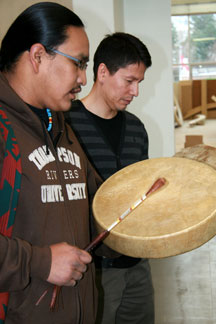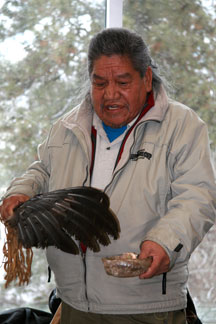Weytk!
TRU welcomes Aboriginal students to a university community that is friendly, supportive, diverse, and student-centered. In addition to the services and supports available to all TRU students, there are a wide variety of services specifically for Aboriginal students to assist you to transition to university life, take advantage of all the opportunities on campus to learn, work, and play, and get the most out of your educational experience.
At Cplul’kw’ten, the Gathering Place, Aboriginal students will find ways to adjust to life on campus. Joanne Brown is the coordinator of the Aboriginal Services team, which offers transition planning, life skills coaching, mentoring, counseling and tutoring.
“What we do at Cplul’kw’ten is build feeling of a home-away-from home,” says Joanne. “We walk with Aboriginal students to ensure Cplul’kw’ten is their community on campus, their place to go.”
“Any good learning happens when people are comfortable,” adds Vernie Clement, TRU’s Aboriginal mentor and community coordinator. “Some stress is important because it pushes people to perform, but in a learning environment, it’s good to have a comfortable environment to come to.”
A graduate of the Bachelor of Business Administration program and former president of the First Nations Student Association, Vernie is responsible for the mentor program, which assists Aboriginal students in first and second year with the transition to student life. He says when he first arrived at TRU, he didn’t realize he needed a connection to the community.
“It helped having other people to talk to in my area of study or even other students who were going through similar struggles—finding a commonality. First Nations cultures from all over are based on family, not just mom and dad, but also the extended members—the grandparents, aunties, uncles, cousins. We come from a very open view of what family means and what community means.”
Cplul’kw’ten creates an atmosphere where everyone tries to encourage and help each other. “We show students who the resource people are so they know them,” says Vernie. “When it comes time to ask for assistance, you don’t have to build a relationship with that person, it’s already there.”
Students can also learn from Aboriginal elders at TRU’s Elder in the House program. Like an aunt, uncle or grandparent, Elders Estella, Jim, and Mike provide conversation and guidance using traditional Aboriginal life skill methods like the talking circle and Elder knowledge.
“As things evolve more people are more aware of what has happened and more people are embracing other ways of knowing and being,” says Joanne. On a daily basis she provides teaching and learning resources to faculty wanting to bring indigenous culture, history and knowledge into their classrooms. “People are realizing that Aboriginal people can make their fair share of contributions back to society in our own unique way that hasn’t been addressed before. All those things are indigenizing academia, which in turn trickles into society.”
“We want post-secondary institutions to be relevant, responsive, and respectful of Aboriginal people—and it’s happening, it’s happening,” she says. “When I attended TRU—I graduated in 2000—there was not one Aboriginal thing on campus. And now to see the Irving K. Barber Centre… the stop signs—that makes me feel that I am important. It makes me feel like this place is receptive to me.
“The drummers and singers at Convocation—I would have been blown away had my ceremony had drummers and singers,” says Joanne. Vernie is well known on campus for drumming and singing at the head of TRU’s convocation recessionals for the past several years. Elders open the ceremonies with a solemn dedication. “I would have been amazed by that, and for me to see that now makes me feel so good.”
Today, Cplul’kw’ten is a centre for TRU’s 1500 Aboriginal students to access campus services, get assistance with band funding applications or scholarships, take workshops on study skills or wellness, find mentors, tutors, housing, or daycare, get advice from an Elder, and above all, connect with each other.
“I think students are comfortable here and aware of the services that we offer,” says Vernie. “And amongst each other, they’re also assisting each other, and that’s the change I’ve noticed most in the past few years.”
You can find out more about the Gathering Place and TRU’s services for Aboriginal students on the Aboriginal Education Resources website.
Recent initiatives:
Transitions Day for Aboriginal Students
Aboriginal TRU Start
Introduction to First Nations Language (Secwepemctsin course)
Aboriginal Courses and Certificates
Research Chair in Aboriginal Early Childhood Development



